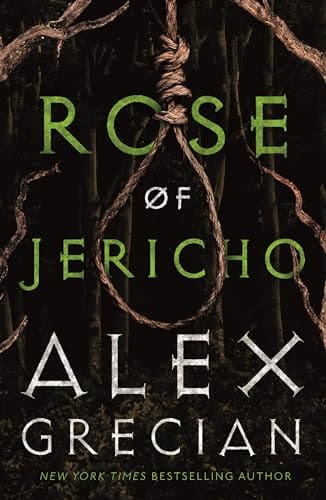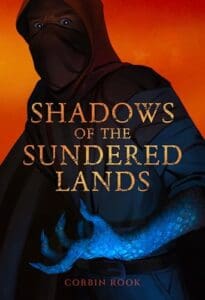
Synopsis:
Something wicked is going on in the village of Ascension. A mother wasting away from cancer is suddenly up and about. A boy trampled by a milk cart walks away from the accident. A hanged man can still speak, broken neck and all.
The dead are not dying.
When Rabbit and Sadie Grace accompany their friend Rose to Ascension to help take care of her ailing cousin, they immediately notice that their new house, Bethany Hall, is occupied by dozens of ghosts. And something is waiting for them in the attic.
The villagers of Ascension are unwelcoming and wary of their weird visitors. As the three women attempt to find out what’s happening in the town, they must be careful not to be found out. But a much larger―and more dangerous―force is galloping straight for them…
Review:
What happens when “Death,” is murdered? In this grotesque fantasy horror, which reads like “Final Destination,” took place during the Salem witch trials, we watch the small town of Ascension grapple with the absence of death. A novel that explores grief (its power), the value of both life and death, and what exactly happens when the natural order grinds to a halt, it turns out that this is a sequel to Grecian’s 2023 novel “Red Rabbit,” although I read it completely oblivious to this, and followed and enjoyed it all the same- it’s a story that stands on its own two decomposing feet. Complete with an other-wordly narrator and a compulsive plot that unfolds over the span of a week, if you’re a fan of witches, ghosts, decomposition, and just general entropy this one may be for you. Thank you Tor Nightfire for my ARC, this one comes out March 11th 2025.
The week in 1881, when Moses Burke murdered the grim reaper, was a strange week indeed. To the delight of her son Benjamin and newly-arrived cousin Rose, Clarissa Sinclair bounces back from her terrible illness and springs out of bed. The same day, when Benjamin is hit by Mr Mulacky’s milk-cart, an accident that should have sent him straight to the pearly gates, he finds that he’s absolutely fine. People everywhere, who should be dead and buried, find themselves making miraculous recoveries. The absence of the grim reaper seems like a blessing, until that blessing curdles, and tensions between the undead and the living begin to rise, the undead begin to grow pale and start losing weight, and the more unfortunate in the cast learn that there are indeed fates worse than death. It is of course the responsibility of Moses Burke, the good Grace sisters who live in Bethany Hall, and the celestial being who lives in their attic to restore order, although where there isn’t order, chaos thrives, and a certain somebody would do anything to keep it that way.
Grecian takes on witches in this novel, in the form of the good Graces, Sadie, Rabbit, and Clarissa Sinclair’s cousin, Rose Nettles. These women are hugely powerful, have been around for centuries, and are very much implicated in this battle between good and evil. One thing that Grecian makes clear from the get go however is that there are things bigger than the sisters, bigger than Ascension, and far, far bigger than us. From the omniscient narrator itself, to the strange being determined to keep death away from the land of the living- the cosmic factor is strong. If Terry Prachett rewrote Dean Koontz’ “Lightning,” through a fantastical, horror fantasy lens, perhaps you’d have something a little like this. “Rose of Jericho,” is a story that is steeped in the vast and unknowable, but interestingly, the author opts to have most of the plot unfold in Ascension. Exploring death itself, something very macro, in a small, puritan-like town, something very micro, simply adds to the existentialism, and the implication that life is short, but that’s good, and it’s best for us to leave it well alone. Mary Shelley would quite like this one.
Despite the messaging being very clear, the circle of life is one that must remain intact, Grecian does not dismiss grief, instead representing it as powerful. The reason Moses Burke is able to kill death is because the grief he feels for his wife is so strong, that he can not only see and interact with the grim reaper, but put a bullet through his head. We should grieve those we love, but to wish they could live forever, is more of a curse than anything. By representing undead life as angry and uncomfortable and exhausting, he brings us a strange sense of comfort, assuring us that eternal slumber is far, far preferable to an eternal, unnatural and tortured slog. This portrayal seems horrifying, but is ultimately reassuring. We’re forced to confront our fears of, and perhaps anger toward, death, and are reminded that it doesn’t have to be the enemy, it’s the merciful conclusion to a life hopefully well-lived.
A novel that’s got a whole bunch going for it, “Rose of Jericho,” by Alex Grecian is part cosmic, part small-town and wholly unputdownable. A rollicking descent into utter chaos, the narrative bounces between witchy intrigue and undead melodrama, what more could you possibly want? Huh? Whilst death may (should…hopefully?) be predictable, this book is anything but.









Leave a Reply